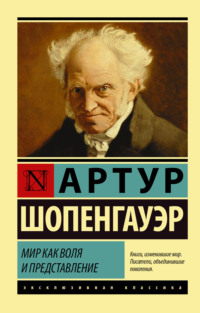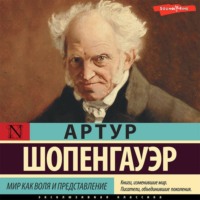 полная версия
полная версияThe Essays of Arthur Schopenhauer; Counsels and Maxims
It need only be remembered that all pleasure is negative, and that pain is positive in its nature, in order to see that the passions can never be a source of happiness, and that age is not the less to be envied on the ground that many pleasures are denied it. For every sort of pleasure is never anything more than the quietive of some need or longing; and that pleasure should come to an end as soon as the need ceases, is no more a subject of complaint than that a man cannot go on eating after he has had his dinner, or fall asleep again after a good night's rest.
So far from youth being the happiest period of life, there is much more truth in the remark made by Plato, at the beginning of the Republic, that the prize should rather be given to old age, because then at last a man is freed from the animal passion which has hitherto never ceased to disquiet him. Nay, it may even be said that the countless and manifold humors which have their source in this passion, and the emotions that spring from it, produce a mild state of madness; and this lasts as long as the man is subject to the spell of the impulse – this evil spirit, as it were, of which there is no riddance – so that he never really becomes a reasonable being until the passion is extinguished.
There is no doubt that, in general, and apart from individual circumstances and particular dispositions, youth is marked by a certain melancholy and sadness, while genial sentiments attach to old age; and the reason for this is nothing but the fact that the young man is still under the service, nay, the forced labor, imposed by that evil spirit, which scarcely ever leaves him a moment to himself. To this source may be traced, directly or indirectly, almost all and every ill that befalls or menaces mankind. The old man is genial and cheerful because, after long lying in the bonds of passion, he can now move about in freedom.
Still, it should not be forgotten that, when this passion is extinguished, the true kernel of life is gone, and nothing remains but the hollow shell; or, from another point of view, life then becomes like a comedy, which, begun by real actors, is continued and brought to an end by automata dressed in their clothes.
However that may be, youth is the period of unrest, and age of repose; and from that very circumstance, the relative degree of pleasure belonging to each may be inferred. The child stretches out its little hands in the eager desire to seize all the pretty things that meet its sight, charmed by the world because all its senses are still so young and fresh. Much the same thing happens with the youth, and he displays greater energy in his quest. He, too, is charmed by all the pretty things and the many pleasing shapes that surround him; and forthwith his imagination conjures up pleasures which the world can never realize. So he is filled with an ardent desire for he knows not what delights – robbing him of all rest and making happiness impossible. But when old age is reached, all this is over and done with, partly because the blood runs cooler and the senses are no longer so easily allured; partly because experience has shown the true value of things and the futility of pleasure, whereby illusion has been gradually dispelled, and the strange fancies and prejudices which previously concealed or distorted a free and true view of the world, have been dissipated and put to flight; with the result that a man can now get a juster and clearer view, and see things as they are, and also in a measure attain more or less insight into the nullity of all things on this earth.
It is this that gives almost every old man, no matter how ordinary his faculties may be, a certain tincture of wisdom, which distinguishes him from the young. But the chief result of all this change is the peace of mind that ensues – a great element in happiness, and, in fact, the condition and essence of it. While the young man fancies that there is a vast amount of good things in the world, if he could only come at them, the old man is steeped in the truth of the Preacher's words, that all things are vanity– knowing that, however gilded the shell, the nut is hollow.
In these later years, and not before, a man comes to a true appreciation of Horace's maxim: Nil admirari. He is directly and sincerely convinced of the vanity of everything and that all the glories of the world are as nothing: his illusions are gone. He is no more beset with the idea that there is any particular amount of happiness anywhere, in the palace or in the cottage, any more than he himself enjoys when he is free from bodily or mental pain. The worldly distinctions of great and small, high and low, exist for him no longer; and in this blissful state of mind the old man may look down with a smile upon all false notions. He is completely undeceived, and knows that whatever may be done to adorn human life and deck it out in finery, its paltry character will soon show through the glitter of its surroundings; and that, paint and be jewel it as one may, it remains everywhere much the same, – an existence which has no true value except in freedom from pain, and is never to be estimated by the presence of pleasure, let alone, then, of display.68
Disillusion is the chief characteristic of old age; for by that time the fictions are gone which gave life its charm and spurred on the mind to activity; the splendors of the world have been proved null and vain; its pomp, grandeur and magnificence are faded. A man has then found out that behind most of the things he wants, and most of the pleasures he longs for, there is very little after all; and so he comes by degrees to see that our existence is all empty and void. It is only when he is seventy years old that he quite understands the first words of the Preacher; and this again explains why it is that old men are sometimes fretful and morose.
It is often said that the common lot of old age is disease and weariness of life. Disease is by no means essential to old age; especially where a really long span of years is to be attained; for as life goes on, the conditions of health and disorder tend to increase —crescente vita, crescit sanitas et morbus. And as far as weariness or boredom is concerned, I have stated above why old age is even less exposed to that form of evil than youth. Nor is boredom by any means to be taken as a necessary accompaniment of that solitude, which, for reasons that do not require to be explained, old age certainly cannot escape; it is rather the fate that awaits those who have never known any other pleasures but the gratification of the senses and the delights of society – who have left their minds unenlightened and their faculties unused. It is quite true that the intellectual faculties decline with the approach of old age; but where they were originally strong, there will always be enough left to combat the onslaught of boredom. And then again, as I have said, experience, knowledge, reflection, and skill in dealing with men, combine to give an old man an increasingly accurate insight into the ways of the world; his judgment becomes keen and he attains a coherent view of life: his mental vision embraces a wider range. Constantly finding new uses for his stores of knowledge and adding to them at every opportunity, he maintains uninterrupted that inward process of self-education, which gives employment and satisfaction to the mind, and thus forms the due reward of all its efforts.
All this serves in some measure as a compensation for decreased intellectual power. And besides, Time, as I have remarked, seems to go much more quickly when we are advanced in years; and this is in itself a preventive of boredom. There is no great harm in the fact that a man's bodily strength decreases in old age, unless, indeed, he requires it to make a living. To be poor when one is old, is a great misfortune. If a man is secure from that, and retains his health, old age may be a very passable time of life. Its chief necessity is to be comfortable and well off; and, in consequence, money is then prized more than ever, because it is a substitute for failing strength. Deserted by Venus, the old man likes to turn to Bacchus to make him merry. In the place of wanting to see things, to travel and learn, comes the desire to speak and teach. It is a piece of good fortune if the old man retains some of his love of study or of music or of the theatre, – if, in general, he is still somewhat susceptible to the things about him; as is, indeed, the case with some people to a very late age. At that time of life, what a man has in himself is of greater advantage to him that ever it was before.
There can be no doubt that most people who have never been anything but dull and stupid, become more and more of automata as they grow old. They have always thought, said and done the same things as their neighbors; and nothing that happens now can change their disposition, or make them act otherwise. To talk to old people of this kind is like writing on the sand; if you produce any impression at all, it is gone almost immediately; old age is here nothing but the caput mortuum of life – all that is essential to manhood is gone. There are cases in which nature supplies a third set of teeth in old age, thereby apparently demonstrating the fact that that period of life is a second childhood.
It is certainly a very melancholy thing that all a man's faculties tend to waste away as he grows old, and at a rate that increases in rapidity: but still, this is a necessary, nay, a beneficial arrangement, as otherwise death, for which it is a preparation, would be too hard to bear. So the greatest boon that follows the attainment of extreme old age is euthanasia, – an easy death, not ushered in by disease, and free from all pain and struggle.69 For let a man live as long as he may, he is never conscious of any moment but the present, one and indivisible; and in those late years the mind loses more every day by sheer forgetfulness than ever it gains anew.
The main difference between youth and age will always be that youth looks forward to life, and old age to death; and that while the one has a short past and a long future before it, the case is just the opposite with the other. It is quite true that when a man is old, to die is the only thing that awaits him; while if he is young, he may expect to live; and the question arises which of the two fates is the more hazardous, and if life is not a matter which, on the whole, it is better to have behind one than before? Does not the Preacher say: the day of death [is better] than the day of one's birth.70 It is certainly a rash thing to wish for long life;71 for as the Spanish proverb has it, it means to see much evil, —Quien larga vida vive mucho mal vide.
A man's individual career is not, as Astrology wishes to make out, to be predicted from observation of the planets; but the course of human life in general, as far as the various periods of it are concerned, may be likened to the succession of the planets: so that we may be said to pass under the influence of each one of them in turn.
At ten, Mercury is in the ascendant; and at that age, a youth, like this planet, is characterized by extreme mobility within a narrow sphere, where trifles have a great effect upon him; but under the guidance of so crafty and eloquent a god, he easily makes great progress. Venus begins her sway during his twentieth year, and then a man is wholly given up to the love of women. At thirty, Mars comes to the front, and he is now all energy and strength, – daring, pugnacious and arrogant.
When a man reaches the age of forty, he is under the rule of the four Asteroids; that is to say, his life has gained something in extension. He is frugal; in other words, by the help of Ceres, he favors what is useful; he has his own hearth, by the influence of Vesta; Pallas has taught him that which is necessary for him to know; and his wife – his Juno– rules as the mistress of his house.
But at the age of fifty, Jupiter is the dominant influence. At that period a man has outlived most of his contemporaries, and he can feel himself superior to the generation about him. He is still in the full enjoyment of his strength, and rich in experience and knowledge; and if he has any power and position of his own, he is endowed with authority over all who stand in his immediate surroundings. He is no more inclined to receive orders from others; he wants to take command himself. The work most suitable to him now is to guide and rule within his own sphere. This is the point where Jupiter culminates, and where the man of fifty years is at his best.
Then comes Saturn, at about the age of sixty, a weight as of lead, dull and slow: —
But old folks, many feign as they were dead;
Unwieldy, slow, heavy and pale as lead.
Last of all, Uranus; or, as the saying is, a man goes to heaven.
I cannot find a place for Neptune, as this planet has been very thoughtlessly named; because I may not call it as it should be called —Eros. Otherwise I should point out how Beginning and End meet together, and how closely and intimately Eros is connected with Death: how Orcus, or Amenthes, as the Egyptians called him, is not only the receiver but the giver of all things – [Greek: lambanon kai didous]. Death is the great reservoir of Life. Everything comes from Orcus; everything that is alive now was once there. Could we but understand the great trick by which that is done, all would be clear!
1
I refer to the proverbs and maxims ascribed, in the Old Testament, to the king of that name.
2
vii. (12) 12.
3
Welt als Wille und Vorstellung. Vol. I., p. 58.
4
Welt als Wille und Vorstellung, vol. ii., ch. 16.
5
Letters to and from Merck.
6
Horace. Odes II. x.
7
Republic, x. 604.
8
Translator's Note. From the Anvár-i Suhailí —TheLights of Canopus– being the Persian version of the Table ofBidpai. Translated by E.B. Eastwick, ch. iii. Story vi., p. 289.
9
Translator's Note. Nicholas "Chamfort" (1741-94), a French miscellaneous writer, whose brilliant conversation, power of sarcasm, and epigrammic force, coupled with an extraordinary career, render him one of the most interesting and remarkable men of his time. Schopenhauer undoubtedly owed much to this writer, to whom he constantly refers.
10
Odes II. xi.
11
Iliad, xix, 65.
12
Ibid, xvii, 514
13
Translator's Note. A series of Greek, Latin and French classics published at Zweibräcken in the Palatinate, from and after the year 1779. Cf. Butter, Ueber die Bipontiner und die editiones Bipontinae.
14
Eudem. Eth. VII. ii. 37.
15
As our body is concealed by the clothes we wear, so our mind is veiled in lies. The veil is always there, and it is only through it that we can sometimes guess at what a man really thinks; just as from his clothes we arrive at the general shape of his body.
16
Paradoxa Stoidorum: II.
17
It is a well-known fact, that we can more easily bear up under evils which fall upon a great many people besides ourselves. As boredom seems to be an evil of this kind, people band together to offer it a common resistance. The love of life is at bottom only the fear of death; and, in the same way, the social impulse does not rest directly upon the love of society, but upon the fear of solitude; it is not alone the charm of being in others' company that people seek, it is the dreary oppression of being alone – the monotony of their own consciousness – that they would avoid. They will do anything to escape it, – even tolerate bad companions, and put up with the feeling of constraint which all society involves, in this case a very burdensome one. But if aversion to such society conquers the aversion to being alone, they become accustomed to solitude and hardened to its immediate effects. They no longer find solitude to be such a very bad thing, and settle down comfortably to it without any hankering after society; – and this, partly because it is only indirectly that they need others' company, and partly because they have become accustomed to the benefits of being alone.
18
Translator's Note. The passage to which Schopenhauer refers is Parerga: vol. ii. § 413 (4th edition). The fable is of certain porcupines, who huddled together for warmth on a cold day; but as they began to prick one another with their quills, they were obliged to disperse. However the cold drove them together again, when just the same thing happened. At last, after many turns of huddling and dispersing, they discovered that they would be best off by remaining at a little distance from one another. In the same way, the need of society drives the human porcupines together – only to be mutually repelled by the many prickly and disagreeable qualities of their nature. The moderate distance which they at last discover to be the only tolerable condition of intercourse, is the code of politeness and fine manners; and those who transgress it are roughly told – in the English phrase —to keep their distance. By this arrangement the mutual need of warmth is only very moderately satisfied, – but then people do not get pricked. A man who has some heat in himself prefers to remain outside, where he will neither prick other people nor get pricked himself.
19
Translator's Note. Angelus Silesius, pseudonym for Johannes Scheffler, a physician and mystic poet of the seventeenth century (1624-77).
20
Psalms, lv. 7.
21
Goethe's Faust, Part I., 1281-5.
22
This restricted, or, as it were, entrenched kind of sociability has been dramatically illustrated in a play – well worth reading – of Moratin's, entitled El Café o sea la Comedia Nuova (The Cafe or the New Comedy), chiefly by one of the characters, Don Pedro and especially in the second and third scenes of the first act.
23
Envy shows how unhappy people are; and their constant attention to what others do and leave undone, how much they are bored.
24
De Ira: iii., 30.
25
Epist. xv.
26
It may be observed, in passing, that a great many of the maxims which Goethe puts under the head of Proverbial, are translations from the Italian.
27
Menander. Monost: 422.
28
Goethe.
29
Epist. I. xviii. 97.
30
Nouveaux Essais. Liv. I. ch. 2. Sec. 11.
31
Of. Welt als Wille und Vorstellung, 4th Edition. Bk. II. pp. 236-40.
32
Cf. loc: cit: p. 275. Sleep is a morsel of death borrowed to keep up and renew the part of life which is exhausted by the day —le sommeil est un emprunt fait à la mort. Or it might be said that sleep is the interest we have to pay on the capital which is called in at death; and the higher the rate of interest and the more regularly it is paid, the further the date of redemption is postponed.
33
Translator's Note. The work to which Schopenhauer here refers is a series of essays by Cabanis, a French philosopher (1757-1808), treating of mental and moral phenomena on a physiological basis. In his later days, Cabanis completely abandoned his materialistic standpoint.
34
Goethe's Faust, Part I.
35
Translator's Note. Helvetius, Claude-Adrien (1715-71), a French philosophical writer much esteemed by Schopenhauer. His chief work, De l'Esprit, excited great interest and opposition at the time of its publication, on account of the author's pronounced materialism.
36
See, for instance, Stobasus, Eclog. I. xxii. 9.
37
To forgive and forget means to throw away dearly bought experience.
38
Translator's Note. Aventurine is a rare kind of quartz; and the same name is given to a brownish-colored glass much resembling it, which is manufactured at Murano. It is so called from the fact that the glass was discovered by chance (arventura).
39
De Clementia, I. 1.
40
Act iv., se. 4.
41
Cf. Welt als Wills und Vorstellung, Bk. II. p. 256 (4th Edit.), where I quote from Dr. Johnson, and from Merck, the friend of Goethe's youth. The former says: There is nothing by which a man exasperates most people more, than by displaying a superior ability of brilliancy in conversation. They seem pleased at the time, but their envy makes them curse him at their hearts. (Boswells Life of Johnson aetat: 74).
42
Translator's Note. – Balthazar Graeian, Oraculo manual, y arte de prudencia, 240. Gracian (1584-1658) was a Spanish prose writer and Jesuit, whose works deal chiefly with the observation of character in the various phenomena of life. Schopenhauer, among others, had a great admiration for his worldly philosophy, and translated his Oraculo manual– a system of rules for the conduct of life – into German. The same book was translated into English towards the close of the seventeenth century.
43
If you desire to get on in the world, friends and acquaintances are by far the best passport to fortune. The possession of a great deal of ability makes a man proud, and therefore not apt to flatter those who have very little, and from whom, on that account, the possession of great ability should be carefully concealed. The consciousness of small intellectual power has just the opposite effect, and is very compatible with a humble, affable and companionable nature, and with respect for what is mean and wretched. This is why an inferior sort of man has so many friends to befriend and encourage him.
These remarks are applicable not only to advancement in political life, but to all competition for places of honor and dignity, nay, even for reputation in the world of science, literature and art. In learned societies, for example, mediocrity – that very acceptable quality – is always to the fore, whilst merit meets with tardy recognition, or with none at all. So it is in everything.
44
Translator's Note. – In the passage referred to (Grundlage der Moral, collected works, Vol. IV., pp. 187 and 198), Schopenhauer explains politeness as a conventional and systematic attempt to mask the egoism of human nature in the small affairs of life, – an egoism so repulsive that some such device is necessary for the purpose of concealing its ugliness. The relation which politeness bears to the true love of one's neighbor is analogous to that existing between justice as an affair of legality, and justice as the real integrity of the heart.
45
Translator's Note. – Schopenhauer alludes to the following passage in Bacon's De Augmentis Scientiarum, Bk. viii., ch. 2: Sicut enim dici solet de calumnia, audacter calumniare, semper aliquid haeret; sic dici potest de jactantia, (nisi plane deformis fuerit et ridicula), audacter te vendita, semper aliquid haeret. Haerebit certe apud populum, licet prudentiores subrideant. Itaque existimatio parta apud plurimos paucorum fastidium abunde compensabit.









